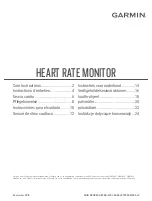
9. GLOSSARY
35
ENGLISH
9. GLOSSARY
Afterimage
The Afterimage is particular to LCD monitors when the monitor screen is left on for
a long period without use. The “Afterimage” can be removed gradually by
changing the displayed image.
Clock
With the analog input signal display, the analog signal is converted to a digital
signal by the LCD circuitry. To convert the signal correctly, the LCD monitor needs
to produce the same number clock pulse as the dot clock of the graphics system.
When the clock pulse is not correctly set, some vertical bars of distortion are
displayed on the screen.
Color Temperature (Temperature)
Color Temperature is a method to measure the white color tone, generally indicated
in degrees Kelvin. At high temperatures the white tone appears somewhat blue,
while at lower temperatures it appears somewhat red. Computer monitors
generally give best perfoemance at high temerature settings.
5000K: Slightly reddish white.
6500K: Warm-white tone, similar to white papaer or daylight.
9,300K: Slightly bluish white.
DVI
(Digital Visual Interface)
A digital flat panel interface. DVI can transmit digital data from the PC directly
without loss with the signal transition method “TMDS”. There are two kinds of
DVI connectors. One is DVI-D connector for digital signal input only. The other is
DVI-I connector for both digital and analog signal inputs.
DVI-DMPM
(DVI Digital Monitor Power Management)
The Power management system for the digital interface. The “Monitor ON” status
(operation mode) and the “Active Off” status (power-saving mode) are indispensable
for the DVI-DMPM as the monitor’s power mode.
Gain Adjustment
Adjusts each color parameter for red, green and blue. The color of the LCD
monitor is displayed through the color filter of the LCD panel. Red, green and blue
are the three primary colors. The colors on the monitor are displayed by
combining these three colors. The color tone can change by adjusting the
illumination amount passed through each color’s filter.











































